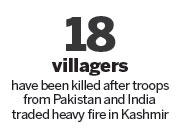Panicked villagers call for ending border clashes
Troops trading heavy fire between Pakistan and India-controlled Kashmir have plunged civilians on both sides into grief with 18 villagers killed and dozens wounded this week, prompting many to question how two nations committed to a 2003 cease-fire could be targeting civilians while trading blame about who started shooting first.
Iram Shazadi was making breakfast for her family on Monday when bullets started whizzing through her dusty Pakistani village of Dhamala Hakimwala - about half a kilometer from the border with the India-controlled portion of the region. A mortar shell fired by Indian border forces slammed into her home and killed her mother-in-law and two sons, aged 5 and 8.
"I lost my whole world," the injured 30-year-old said on Wednesday at a military hospital in Sialkot. She sat crying next to her 6-year-old son, who narrowly escaped the blast.
On the India-controlled side, farmer Gulshan Kumar spent Tuesday night huddled with his family at home while mortars from Pakistan fell on his village of Chilyari.

Worst violation
"A shell landed in our neighbor's home, killing a 70-year-old woman and her 32-year-old daughter-in-law," Kumar told reporters.
The fighting over the past four nights marks the worst violation of the 2003 cease-fire accord brokered between India and Pakistan after several years of nearly daily battles, officials on both sides said.
While minor skirmishes have been somewhat common over the years, many were shocked that this week's fighting fell over the Muslim holiday of Eid al-Adha and left civilian casualties - nine in Pakistan and nine in India.
Tens of thousands of villagers have fled their homes on both sides since Sunday night, when the violence first erupted along the 200-kilometer border between Pakistan's Punjab province and India-controlled Kashmir.
That lower-altitude frontier, guarded by paramilitary border forces, is lined on both sides by agricultural fields and ancient villages that have been there long before Pakistan and India gained independence in 1947 and began wrangling over Kashmir - fighting two of three wars over their rival claims to the mountainous region.
"We have a very serious situation at hand right now," said Shantmanu, an Indian administrator in the area who uses one name.
Panicked villagers on both sides said they were desperate for peace.
'State of fear'
"I have been seeing these clashes since my childhood," said 35-year-old Rehmat Bibi in Dhamala Hakimwala, where homes are now pockmarked by bullet holes and streets are largely deserted. "We are living in a state of fear."
The clashes come despite stated desires by both governments on improving ties. Indian Prime Minister Narendra Modi said he wanted to engage Pakistan and even invited its prime minister, Nawaz Sharif, to attend his inauguration in May. But relations remain hostile, and in August India canceled talks with Pakistan after its ambassador met with Kashmiri separatist leaders.
Analysts said the civilian tolls have taken this flare-up to a new level of seriousness.
"At the moment, both sides are digging their heels in, with no meeting of their army commanders scheduled," said defense analyst C. Uday Bhaskar of the New Delhi-based think tank, the Society for Policy Studies.
(China Daily 10/10/2014 page11)














